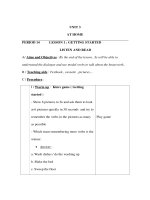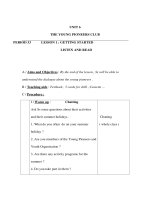Unit 3 lesson 1 getting started listen and read period 12 week 4
Bạn đang xem bản rút gọn của tài liệu. Xem và tải ngay bản đầy đủ của tài liệu tại đây (69.47 KB, 3 trang )
Gi¸o ¸n TiÕng anh 8
Phßng gi¸o dôc MÜ hµo
Trêng thcs d¬ng quang
TuÇn: 4
Ngµy so¹n:
d¹y:
TiÕt: 12
Ngµy
Unit 3 at home
Lesson 1 Getting started & Listen and read
A. The objectives
- By the end of the lesson, Ss will be able to understand the dialogue and use
the language to talk about the chores they have to do at home.
b. content: Vocabulary: stove, sauce pan, cupboard, cook dinner, make the
bed, do the washing up, etc
Grammar: Have to + infinitive (obligation), ought to + infinitive (advice),
future forms, present simple tense, prepositions of place, reflexive pronouns.
C. Materials:
pictures, disk, CD player,
Work arrangements: Individuals, pairs, groups, T-WC
Anticipated problems:
D. Procedure
I. Warmer
Slap the board/ Matching
Teacher reads: I have to cook meals
at home
I have to wash the dishes/ do the
washing up
Or: Match the pictures with the
correct phrases. Practice these
phrases aloud
Practice asking and answering in
pairs
What do you have to do at home?
Do you have to make the bed?
II. Checking the old lesson
I. Getting started
- cook meals
- wash the dishes/ do the washing up
- feed the chickens/ pigs
- clean the windows
- sweep the floor
- make the bed
- tidy up
- look after younger brothers/ sisters
- water the flowers/ vegetables
III. New lesson
Presentation
Pre-teach
Eliciting: visual, situations/
explanation
Modeling, choral & individual
repetition
Written record, pronunciation, VN
meaning
Checking vocabulary:
II. Listen and read
- a cupboard:
- a steamer
- a sink
- a sauce pan
- a frying pan
- to give one’s love to somebody
- to be home late:
1. Practice the dialogue with a
Vò M¹nh Hµ / / 0982928076
1
What is this in English? How do you
spell it?
Make example sentences
Presentation dialogue
Set the scene, introduce the
characters: Mrs. Vui, Nam’s mother
is calling home.
She asks Nam to do some chores.
Listen and find out what Nam has to
do.
Listen to the dialogue twice
Answer the open questions
Listen and repeat the dialogue in
chorus
Practice the dialogue in pairs
Read the dialogue silently
Do the comprehension check
Concept check:
You have to cook dinner yourself
You ought to go to the market to buy
some fish and vegetables
Meaning
Form:
S + have to + infinitive (to talk about
obligations)
S + ought to + infinitive (to talk
about advice)
Pronunciation: have to, ought to
Practice
Word cue drill
Run through the cues
Teacher models: I have to cook meals
Students repeat in chorus,
individually
Teacher asks, students answer in
chorus
Practice asking and answering in
half-half and open pairs then closed
pairs
partner
2. Complete the list of things Nam
has to do
- cook dinner
- go to the market
- buy some fish and vegetables
- call aunt Chi
Model sentences:
You have to cook dinner yourself
You ought to go to the market to buy
some fish and vegetables
What do you have to do?
I have to cook dinner
What do you have to do?
I have to make the bed
Find someone who ...
Cook meals?
Tidy up?
Sweep the floor?
Name
Do you have to cook meals?
Yes, I do
Do you have to feed the chickens?
Yes, I do.
Nga has to cook meals, Hoa has to
feed the chickens, etc
Production
Take a class survey/ Find
someone who
Vò M¹nh Hµ / / 0982928076
2
Ask students to copy the table
Elicit the chores
Give instructions
Students do the activity
Get students to report back the
result of the survey
IV. Consolidation
V. Homework
Things you often do at home
Have to/ ought to
Kitchen vocabulary
Study vocabulary by heart
Read the dialogue again + write
dictation
Practice talking about the chores you
do at home
Prepare new lesson: Speak
..........................................................................................................
Vò M¹nh Hµ / / 0982928076
3









